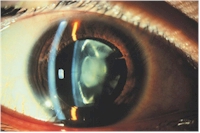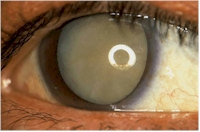Cataract Surgery
Cataract surgery is the most commonly performed operation in the UK. You probably know someone who has had cataracts removed. It is usually highly successful and often leads to substantial improvements in quality of life. Even so, cataract surgery is not a small risk-free operation that always restores excellent vision. A successful outcome depends on many factors. Whilst extensive surgical experience and meticulous surgical technique are essential, a careful assessment and discussion prior to surgery is also needed to ensure full understanding and appropriate expectations. I have performed several thousand successful cataract operations, frequently see complex or difficult cases, and (in the NHS) am involved in training new ophthalmologists in cataract surgery. If you have been told you have a cataract, or think you might, I would be pleased to discuss this with you and to advise on whether or not surgery is needed, and if so the likely benefits. Most people have a number of questions about cataract surgery which I hope to answer below.
Click here to see my results
 |
 |
| Moderate cataract |
Advanced cataract |
What is a cataract?
A cataract is a clouding of the lens inside your eye. The lens is a clear structure just behind the iris (the coloured part of the eye). It helps to focus light to form a clear image on the retina at the back of the eye in much the same way as the lens in a camera focuses light onto a film. When a cataract develops your vision deteriorates because the eye can no longer form a clear image on the retina. A cataract is not a layer of skin that grows over your eye. Many people over 60 have some cataract and the vast majority can be treated successfully.
How does cataract affect your sight?
Blurry sight - This is very common. You may notice that your sight has become blurred or misty, or that your glasses seem dirty or appear scratched.
Dazzle - You may be dazzled by lights, such as car headlamps, and sunlight.
Change of colour vision - Your colour vision may become washed out or faded.
Occasionally the pupil becomes noticeably grey or white.
What causes a cataract
Cataracts can form at any age. Most are due to ageing. Some are due to other eye diseases eg intra-ocular inflammation, trauma or previous radiotherapy or steroid treatment, or systemic diseases such as diabetes. Occasionally cataracts are congenital.
What treatment is available?
The most effective treatment for cataracts is an operation to remove the cloudy lens. Diets or drugs have not been shown to slow or stop the development of cataract.
When should I have the operation?
In the past, ophthalmologists often waited until the cataract became ‘ripe’ and your vision was very poor before suggesting you had the cataract removed. With modern surgery, the operation is usually now carried out as soon as your eyesight interferes with your daily life and your ability to read, to work, to drive or do the things you enjoy. You will probably want to consider surgery if this is the case.
If you are a driver you must reach the visual standard required by the Drivers and Vehicle licensing Authority and it may be necessary to have the cataract removed in order to keep your licence.
What happens during the operation?
Huge progress has been made in cataract surgery. In most cases the cataract can now be removed quickly, safely and painlessly and a clear new lens (implant) placed inside your eye to restore sight. Prior to the operation you will be given eye-drops to enlarge the pupil. Cataract surgery is usually performed with a local anaesthetic but a general anaesthetic is occasionally used. With a local anaesthetic you will be awake during the operation but the eye will be completely numb. The anaesthetic usually consists of eye drops and occasionally a local anaesthetic injection into the area around the eye.
During the operation you will be asked to keep your head still, and lie as flat as possible. You will not be able to see any detail but will be aware of movement, a bright light and occasionally coloured flashes. The operation usually takes about 15-20 minutes.
Modern cataract microsurgery uses a technique called phacoemulsification to remove the lens. A very small cut (approximately 2mm) is made in the eye. A fine probe is inserted which uses ultrasound energy to soften and remove the cataract. A permanent artificial lens implant made of clear plastic polymer is then inserted. Stitches are rarely required as the small wound rapidly self-seals. Wherever necessary I will also perform additional steps to minimise astigmatism. At the end of the operation, a pad or shield is placed over the eye to protect it.
What happens after the operation?
Most people notice a rapid improvement in eyesight. It is normal to feel some itching and grittiness of the eyelids and mild discomfort for a while after cataract surgery. If you have discomfort, I suggest you take a pain reliever such as paracetamol. After 2 - 3 days even mild discomfort should disappear. Most people will have the operation and go home on the same day, and will be able to carry on with most normal daily activities. You will normally be given a follow-up appointment 1–3 weeks after your operation.
You will be given eyedrops to reduce inflammation. The hospital staff will explain when and how to use them. Please do not rub your eye. Certain symptoms could mean that you need treatment. Please contact the hospital immediately if you have any of the following symptoms:-
- Excessive pain
- Loss of vision
- Increasing redness or stickiness of the eye
What are the benefits and risks of cataract surgery?
Cataract surgery is one of the most successful operations and the vast majority of patients have an improvement in their vision. There is usually greater clarity and sharpness and you will probably also notice colours being brighter and clearer. Overall quality of life usually improves, often dramatically where cataracts are significantly compromising vision.
The benefits of surgery may be limited where vision has been lost due to other eye conditions such as glaucoma, diabetes or age-related macular degeneration though, depending on the level of cataract present, it may still be worthwhile.
Cataract surgery is a very safe procedure but in common with other operations, you should be aware that there is a small risk of complications, either during or after the operation. Although most can be treated effectively, very occasionally further surgery is necessary and in extreme cases, there can be a marked reduction or even a complete loss of vision.
One of the most common complications (approximately 5%) is a thickening of the lens capsule that supports the new lens implant (posterior capsule opacification). This reduces vision in a similar way to a cataract and may occur any time in the first few years after the operation. It is easily corrected with laser treatment.
Click here to see my results
Will I need glasses after the operation?
Whilst the main aim of cataract surgery is to improve eyesight modern techniques also allow for adjustment of refractive error to minimise or occasionally avoid the need for glasses following surgery. Long-sightedness (hyperopia), short-sightedness (myopia) and astigmatism can all be reduced or eliminated by appropriate planning of the surgery with the aim of providing distance vision without glasses that is as clear as possible. Reading glasses are then used for close work. There are also opportunities for aiming for spectacle independence by using multifocal lens implants (lens simultaneously provides focus for distance and near) or monovision (one eye corrected for distance, other for near). These options are both an advantage and a compromise and need careful discussion to allow an informed decision to be made.